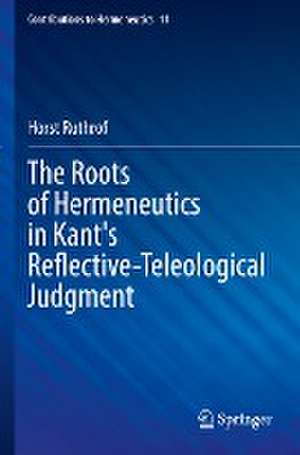The Roots of Hermeneutics in Kant's Reflective-Teleological Judgment: Contributions to Hermeneutics, cartea 11
Autor Horst Ruthrofen Limba Engleză Paperback – 29 noi 2023
This book challenges the standard view that modern hermeneutics begins with Friedrich Ast and Friedrich Schleiermacher, arguing instead that it is the dialectic of reflective and teleological reason in Kant’s Critique of Judgment that provides the actual proto-hermeneutic foundation. It is revolutionary in doing so by replacing interpretive truth claims by the more appropriate claim of rendering opaque contexts intelligible. Taking Gadamer’s comprehensive analysis of hermeneutics in Truth and Method (1960) as its point of departure, the book turns to Kant’s Critiques, reviewing his major concepts as a coherent system in relation to his sensus communis. At the heart of the book is the interaction between reflective, bottom-up search and teleological, top-down interpretative projection as provided in Part II of the third Critique.
This text contends that Kant’s broad definition of nature invites the liberation of thereflective-teleological judgment from its biological exemplifications and so permits us to establish its generalised status as a path-breaking, methodological tool. Kant’s dialectic of reflective search and meaning bestowing, stipulated teleology is asserted to anticipate a series of motifs commonly associated with hermeneutics. Figures covered include Dilthey, Husserl, Ingarden, Heidegger, Gadamer, Apel, Habermas, Ricoeur, Derrida, Foucault, Lyotard, Deleuze, Vattimo, Nancy and Caputo. Their collective contributions to interpretation allow for a review of the evolution of hermeneutics from the perspective of the Kantian critique of the limitations of human cognition. The book is written for the informed, general reader, but will likewise appeal to advanced undergraduate and graduate students as well as researchers in the humanities and social sciences.
| Toate formatele și edițiile | Preț | Express |
|---|---|---|
| Paperback (1) | 733.15 lei 6-8 săpt. | |
| Springer International Publishing – 29 noi 2023 | 733.15 lei 6-8 săpt. | |
| Hardback (1) | 739.18 lei 6-8 săpt. | |
| Springer International Publishing – 29 noi 2022 | 739.18 lei 6-8 săpt. |
Preț: 733.15 lei
Preț vechi: 894.09 lei
-18% Nou
Puncte Express: 1100
Preț estimativ în valută:
140.28€ • 146.47$ • 116.11£
140.28€ • 146.47$ • 116.11£
Carte tipărită la comandă
Livrare economică 04-18 aprilie
Preluare comenzi: 021 569.72.76
Specificații
ISBN-13: 9783031186394
ISBN-10: 3031186397
Pagini: 402
Ilustrații: XXVII, 402 p.
Dimensiuni: 155 x 235 mm
Greutate: 0.6 kg
Ediția:1st ed. 2023
Editura: Springer International Publishing
Colecția Springer
Seria Contributions to Hermeneutics
Locul publicării:Cham, Switzerland
ISBN-10: 3031186397
Pagini: 402
Ilustrații: XXVII, 402 p.
Dimensiuni: 155 x 235 mm
Greutate: 0.6 kg
Ediția:1st ed. 2023
Editura: Springer International Publishing
Colecția Springer
Seria Contributions to Hermeneutics
Locul publicării:Cham, Switzerland
Cuprins
Introduction: Gadamer – Benchmark of Hermeneutics.- The Chiastic Structure of Kant’s Critical Concepts.- Kant’s Proto-Hermeneutics.- Kant’s Conception of Natural Language.- Ast, Schleiermacher, Dilthey: Hermeneutics as Inductive Reconstruction.- Husserl and Ingarden: Hermeneutic Intentionality.- Heidegger: Being and the Hermeneutics of Pro-jection.- Ricoeur: Hermeneutics as Self-Recognition.- Apel and Habermas: Emancipatory Hermeneutics.- Foucault, Derrida, Lyotard: Decentred Hermeneutics.- Vattimo, Nancy, Caputo: Hermeneutics in the Shadow of Nihilism.- Conclusion: Hermeneutics of the Absolute.
Notă biografică
Having taught English literature and language philosophy for some 40 years, Horst Ruthrof is a founding member of Murdoch University in Perth and a Fellow of the Australian Academy of the Humanities. He is the author of The Reader’s Construction of Narrative (1981; 2017); Pandora and Occam: On the Limits of Language and Literature (1992; 2017); Semantics and the Body: Meaning from Frege to the Postmodern (1997; 1998); The Body in Language (2000; 2015); Language and Imaginability (2014); and Husserl’s Phenomenology of Language: Intersubjectivity and Communality in the Nachlass (2021).
Textul de pe ultima copertă
This book challenges the standard view that modern hermeneutics begins with Friedrich Ast and Friedrich Schleiermacher, arguing instead that it is the dialectic of reflective and teleological reason in Kant’s Critique of Judgment that provides the actual proto-hermeneutic foundation. It is revolutionary in doing so by replacing interpretive truth claims by the more appropriate claim of rendering opaque contexts intelligible. Taking Gadamer’s comprehensive analysis of hermeneutics in Truth and Method (1960) as its point of departure, the book turns to Kant’s Critiques, reviewing his major concepts as a coherent system in relation to his sensus communis. At the heart of the book is the interaction between reflective, bottom-up search and teleological, top-down interpretative projection as provided in Part II of the third Critique.
This text contends that Kant’s broad definition of nature invites the liberation of the reflective-teleological judgment from its biological exemplifications and so permits us to establish its generalised status as a path-breaking, methodological tool. Kant’s dialectic of reflective search and meaning bestowing, stipulated teleology is asserted to anticipate a series of motifs commonly associated with hermeneutics. Figures covered include Dilthey, Husserl, Ingarden, Heidegger, Gadamer, Apel, Habermas, Ricoeur, Derrida, Foucault, Lyotard, Deleuze, Vattimo, Nancy and Caputo. Their collective contributions to interpretation allow for a review of the evolution of hermeneutics from the perspective of the Kantian critique of the limitations of human cognition. The book is written for the informed, general reader, but will likewise appeal to advanced undergraduate and graduate students as well as researchers in the humanities and social sciences.
Caracteristici
Connects Kant’s reflective teleology to modern hermeneutics Liberates Kant’s reflective-teleological dialectic from the example of nature Critiques human cognitive limitations from Kant to the present












